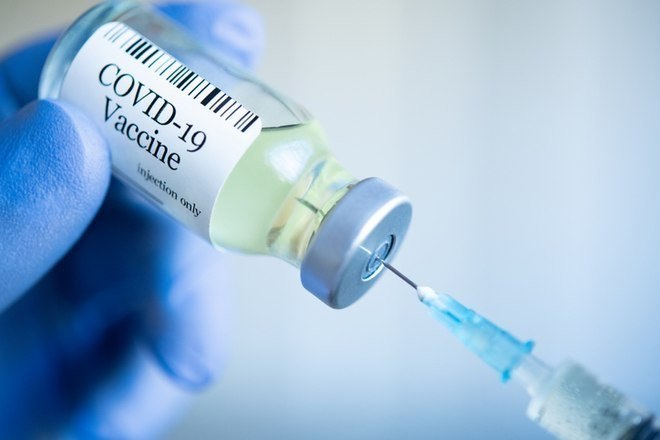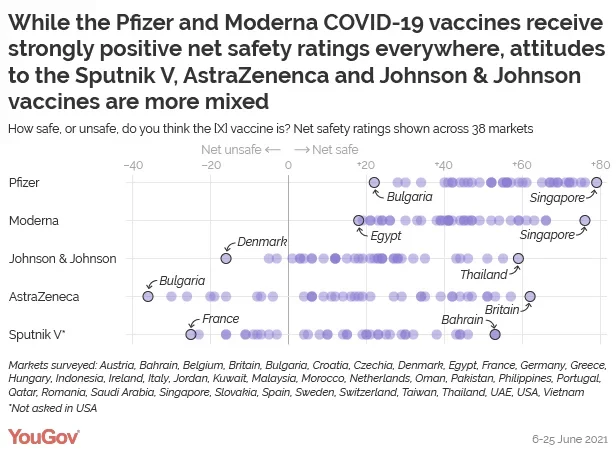
How safe are the COVID-19 vaccines seen as internationally?
YouGov’s global study shows how safe are Covid vaccines seen across 38 markets
With vaccination programs in force across the world, a new YouGov study, conducted in 38 markets, shows how safe people consider several of the different vaccines to be.
Pfizer, AstraZeneca, Moderna, Johnson & Johnson and Sputnik V
The results show that the Pfizer vaccine received a net positive safety score in every country surveyed, meaning that more people in each place considered that vaccine safe than considered it unsafe.
In both UAE and KSA, the Pfizer vaccine received a net positive score of +67 and +61 respectively, with the public seeing the vaccine to be more safe than unsafe.
This is higher than its score in European countries like Bulgaria (+22), Croatia (+46), Romania (+42), Greece, and Hungary (+55 each). In fact, the lowest score the Pfizer vaccine received was in Bulgaria (+22), where 48% see it as safe compared to 25% who see it as unsafe.
Apart from Pfizer, two other vaccines that have received high positive safety scores in UAE and KSA are Moderna and AstraZeneca. Between the two countries, UAE residents are more likely than the KSA public to consider both Moderna (+49 in UAE vs +26 in KSA respectively) and AstraZeneca vaccine (+47 vs +39) safe.
Although AstraZeneca managed to get a positive score in the Middle Eastern countries, it is seen as more unsafe than safe in nine nations. The countries giving it a negative score are all European, including -20 in Italy, -26 in France, -30 in Denmark, and -36 in Bulgaria. The highest score the AstraZeneca vaccine received is +62 in Britain – the country from which it originates.

The Johnson & Johnson vaccine is also generally seen as safe globally, although it tends to score much lower than Pfizer and Moderna. It also receives negative net safety scores in three countries: Switzerland (-3), France (-5) and Denmark (-16). Use of the vaccine has been banned entirely in Denmark, following a blood clots scare in May.
Russia’s Sputnik V vaccine is the most likely to be seen as unsafe, receiving a negative net score in 11 places. Ten of these places are in Europe* (the exception being Taiwan): the vaccine has not been approved by the European Medicines Agency, although it has nevertheless been rolled out in Hungary (where it scores +30). People in Bahrain are the most likely to consider the vaccine safe, at +53.
Sinopharm, Sinovac and Covaxin
The study also looked at perceived safety of other vaccines in a smaller portion of countries (as such vaccines are unlikely to ever be used in most of Europe and America).
The Sinopharm vaccine is most likely seen as safe in UAE, at +63. The vaccine also received a net positive score in all Middle Eastern countries, ranging from +5 in Kuwait to +46 in Bahrain and is generally considered to be safe in all 18 markets where we asked about the Sinopharm vaccine, except in Taiwan (at -4).
The Taiwanese seem to be even more sceptical of the Sinovac vaccine, giving it a score of -27. Thai people are also torn on Sinovac, with a net score of -1. In the other five places where YouGov asked about Sinovac – Singapore, Vietnam, Indonesia, Malaysia and the Philippines – the vaccine received strongly positive scores of between +32 and +66.
Covaxin, an Indian-developed vaccine, receives positive net scores in all eight places where we asked about it, ranging from +8 in Taiwan to +42 in Vietnam.
*We did not ask about Sputnik V in the USA
Results based on around 48,000 respondents surveyed between 6-25 June 2021